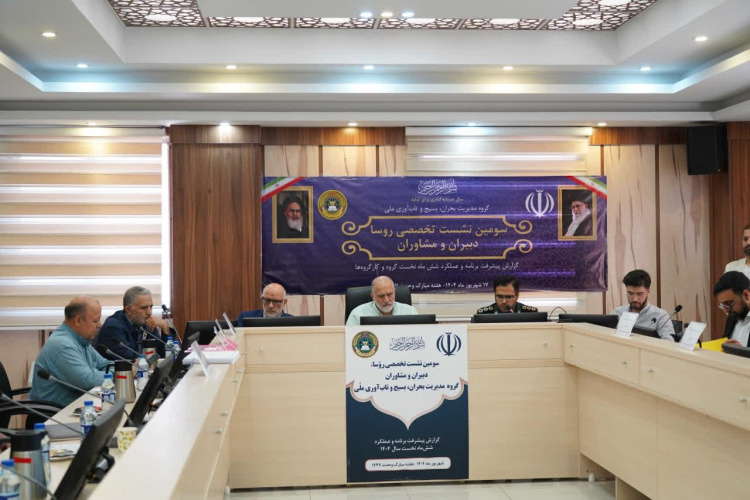Evaluation Meeting of the First Half-Year and Third Specialized Meeting of Crisis Management Working Groups Held at the Supreme National Defense University

According to the Center for Communications and International Relations of the Supreme National Defense University, the evaluation meeting of the first half-year performance of crisis management group projects and the third specialized meeting of heads, secretaries, and advisors of crisis management working groups was held on Tuesday, September 7, 2025, at this university.
At the beginning of the meeting, Mr. Hossein Baqeri, Deputy of the Crisis Management Group, National Mobilization, and Resilience, welcomed the attendees and emphasized several points: the necessity of defining a precise timeline (Gantt chart) for tracking and compensating for potential project delays, linking activities and research to the annual slogan announced by the Supreme Leader (may his shadow last) “Investment for Production,” the importance of public participation and the role of NGOs in crisis management, the need to utilize the experiences of the 12-day imposed war as a national model for resilience and crisis management, and encouraging working groups to complete unfinished projects while maximizing the remaining opportunities until the end of the year.
The morning session of the meeting began with an evaluation of the first half-year projects of 2025. In this section, experts, researchers, and project managers presented their achievements in areas such as urban flood crisis simulation, examination of climate-oceanic links, development of a crisis management encyclopedia, and strategic crisis management from the perspective of the Quran. The role of NGOs in crisis management and ethical and religious viewpoints on national resilience were also discussed. The afternoon session was dedicated to the third specialized meeting of heads, secretaries, and advisors of the working groups.
In this meeting, the working groups on fundamental studies, education and empowerment, prevention and risk reduction, preparedness and response, reconstruction and rehabilitation, as well as the crisis management working group of the Expediency Discernment Council presented reports on their six-month performance, research and educational achievements, and experiences from the 12-day imposed war. Advisors and representatives of NGOs also shared their views and suggestions.
At the end, Dr. Seyyed Mehdi Hashemi, Head of the Crisis Management Group, summarized the discussions and emphasized the necessity of fostering hope, generating knowledge, having a precise plan, compensating for delays, completing unfinished projects, and submitting performance documents of the working groups to the group office. He also highlighted the importance of addressing emerging issues such as “HAARP” and maintaining ongoing communication between research and implementation.
This one-day event concluded with an emphasis on following up on resolutions, enhancing synergy, and the extensive role of working groups in the country’s crisis management.



Your Comment :